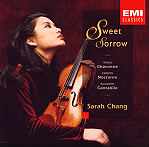Among the many talented young violinists who have emerged in the last decade, Sarah Chang has withstood the test of time. She has bravely managed the delicate transition from child prodigy to adult performer — at least as far as her look is concerned. Musically, she also has her own voice, distinguished by a warm tone, a tight vibrato, and a sharp high register. The quality of her playing varies among the 13 selections in this bittersweet collection of previously released material. If the earlier recordings (Chopin Nocturne No. 20 and Liszt Consolation No. 3 in Nathan Milstein arrangements, Brahms Hungarian Dance No. 1) sound a bit constrained and stiff, the later ones reveal a more flexible musician, technically at ease. But why does she use the same monotonous color and expression in every piece? The Canzonetta from Tchaikovsky’s Concerto sounds the same as the Andante from Lalo’s Symphonie espagnole. Sarah Chang’s lament-like tone works best in the Vitali Chaconne transcribed by Léopold Charlier, the only new recording on this CD, and in the melancholic cantabile of the Gluck/Kreisler Mélodie. Fans will enjoy.
































